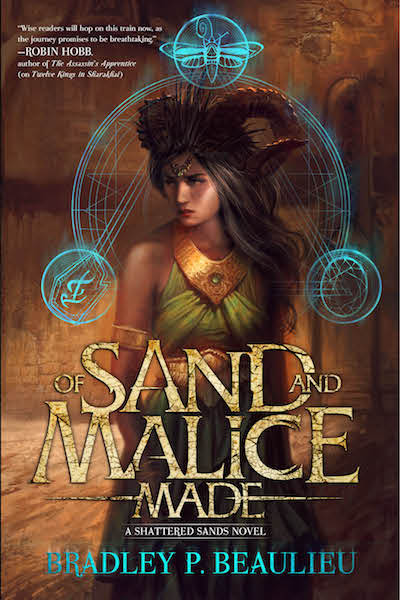Before she started her quest for vengeance against the Twelve Kings of Sharakhai, Ceda had a different encounter with the supernatural otherness that infuses the world of the Shattered Sands. Early in her career as a pit fighter, her exploits, and a chance encounter, brought her to the attention of Rümayesh. Rümayesh is an ehrekh, a creature of fire and chaos living in Sharakhai under the guise of humanity. Her interest and fascination with Ceda, however, as with all who attracted her attention, is a corrosive, sadistic and destructive one, as befits her nature. Ceda found herself having to protect much more than just herself in order to ward against the creature’s manipulations.
This is the story told in Of Sand and Malice Made, by Bradley Beaulieu.
Of Sand and Malice Made isn’t really a prequel as I expected at the outset, but rather a side story to Ceda’s main tale. While Twelve Kings of Sharakhai has a number of threads in different time periods, Of Sand and Malice made is a much more straightforward narrative, set in a single time frame in between a couple of the time frames in Twelve Kings. Ceda is already the White Wolf, but relatively young and new to the arena, her youth being much more noteworthy than her skill. Ceda is still fighting for a place there, fighting to make her name. The novel does well in showing that she’s not the force of nature that she is in the “present” portions of Twelve Kings in Sharakhai.
Rümayesh herself is by far the most interesting portion of the novel. The cover artist, too, seems to have recognized this, as it is her, and not Ceda, who adorns the cover of the short novel, and for good reason. Strongly defined personality, goals, and a clear set up in opposition to Ceda, Rümayesh is a distinctive antagonist who really drives the plot of the novel, much to Ceda’s own dislike of being played by the ehrekh. In some ways, it almost feels a bit of a letdown to use such a character in a side story to Ceda’s quest rather than the main plot, she is that distinctive and interesting. On the other hand, I suspect that the ehrekh could easily derail or distort Ceda’s quest against the Twelve Kings and perhaps warp the plot in unmanageable fashion, she’s that potent of a strange attractor of a character.
Overall, though, I think the novel is just a tiny tiny bit underwritten for new readers, readers who are not familiar with Ceda and her story, in order to start her. Just a tad more (which would be to readers of Twelve Kings, slightly redundant) re-establishment of some of Ceda’s facets and her world would make this short novel ideal for those readers curious about the Twelve Kings world, but unwilling to make the epic fantasy novel commitment of the first, major volume in the series. Readers of that volume, however, will find much to love here, fleshing out as it does more about the denizens of the city, the supernatural world of the Shattered Sands, more about Ceda’s more-complicated-than-expected backstory, and of course, the fact and practice of the presence of beings like Rümayesh herself.
The only other thing that niggles at me is a consequence of the form in writing a story not in the main timeline of a series: its sudden intrusion into a character’s personality and journey that isn’t always accounted for in the narrative of the main novels. To use another example, years after she started the Miles Vorkosigan novels, Lois McMaster Bujold wrote Cetaganda, an early episode in Miles’ history, much earlier than the “current day” timeline. It’s a fascinating and interesting novel, which explores a lot of new ground about the Cetagandans. However, the consequences of that encounter should have resonated and reflected in events we have already seen in novels already written that are set later than Cetaganda. But those novels do not reflect that story at all, to the point that Cetaganda’s events seem to have been downplayed to an unreasonable degree. Only having one novel to date means there is less friction with presenting the story of Ceda and Rümayesh than there might otherwise be, but there is a little, I find.
Still, the novel is well written, engaging, and with excellent character pieces. This is a less action-filled piece than some sections of Twelve Kings, but I think that’s a good thing, given where we are in Ceda’s career. We don’t need an excessive number of fights, and Beaulieu expends his writer’s ammo elsewhere. The short, sharp bite of the novel, which feels, acts and seems to be written in three succeeding stories rather than a single narrative, means that it is a brief look at an episode of Ceda’s life that provides detail, color, and fleshing out without outstaying its welcome. Until I read the next chapter in the Twelve Kings storyline, Of Sand and Malice made an interesting and worthwhile diversion into the dunes of Beaulieu’s world and characters.









